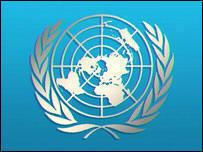|
UN approves new
Somalia sanctions to reduce arms

The U.N. Security Council voted
unanimously Thursday to impose new sanctions aimed at reducing the
arms flowing into Somalia and the lawlessness and piracy that have
flourished there.
It was difficult to say how the sanctions would be carried out in
Somalia, as those responsible for much of the anarchy plaguing the
country are well outside any tradititional finance system. Ransoms
the pirates get for seizing ships come in cash — sometimes dropped
in burlap sacks from buzzing helicopters, or in waterproof suitcases
loaded onto skiffs.
The 15-nation council, the U.N.'s most powerful body, endorsed a
British plan for a council panel to recommend people and entities
whose financial assets would be frozen by nations.
"Not Somalia itself, but on individuals in Somalia who obstruct the
peace process there, who breach the arms embargo or who obstruct the
delivery of humanitarian aid," British Ambassador John Sawers
emphasized.
The council's action comes as the African Union urged the U.N. on
Thursday to quickly send peacekeepers to Somalia.
In the past two weeks Somalia's increasingly brazen pirates have
seized eight vessels including a huge Saudi supertanker loaded with
$100 million worth of crude oil. Several hundred crew are now in the
hands of Somali pirates.
Council members say the added sanctions, which exclude money
intended for basic expenses like food and medicine, are intended to
strengthen Somalia's weak U.N.-backed government.
Haile Menkerios, the U.N. assistant secretary-general for political
affairs, told the council that just last month more than 37,000
people were displaced from Mogadishu, the nation's capital and
largest city, due to insecurity and sporadic attacks. Humanitarian
and food aid is increasingly difficult to deliver for 1 million
Somalis, he said, and hard-line groups are expanding their military
operations in south-central Somalia.
The latest sanctions resolution also reaffirms the U.N.'s arms
embargo against Somalia under resolutions since 1992.
Source: Associated Press
|